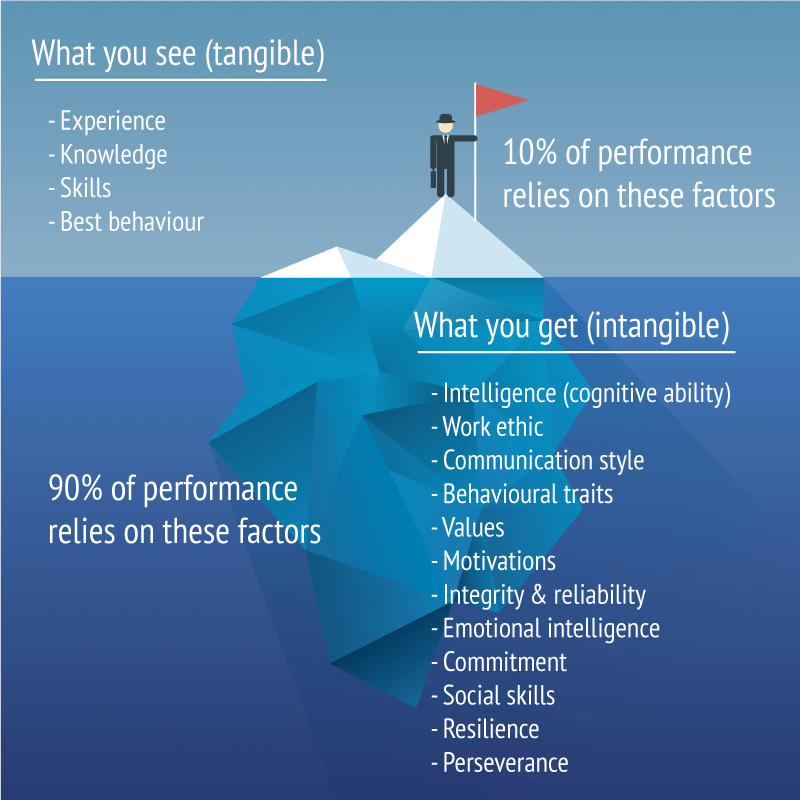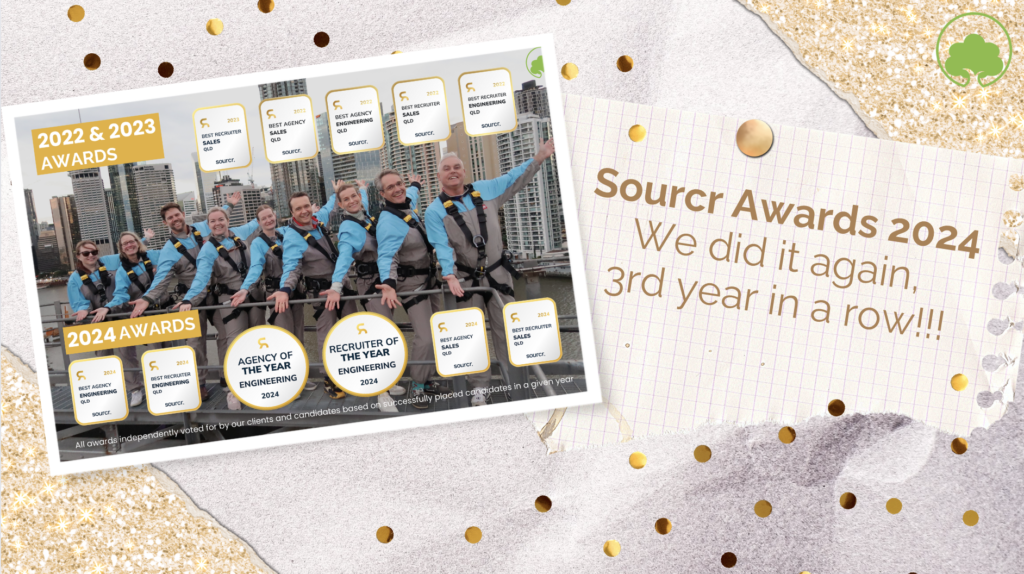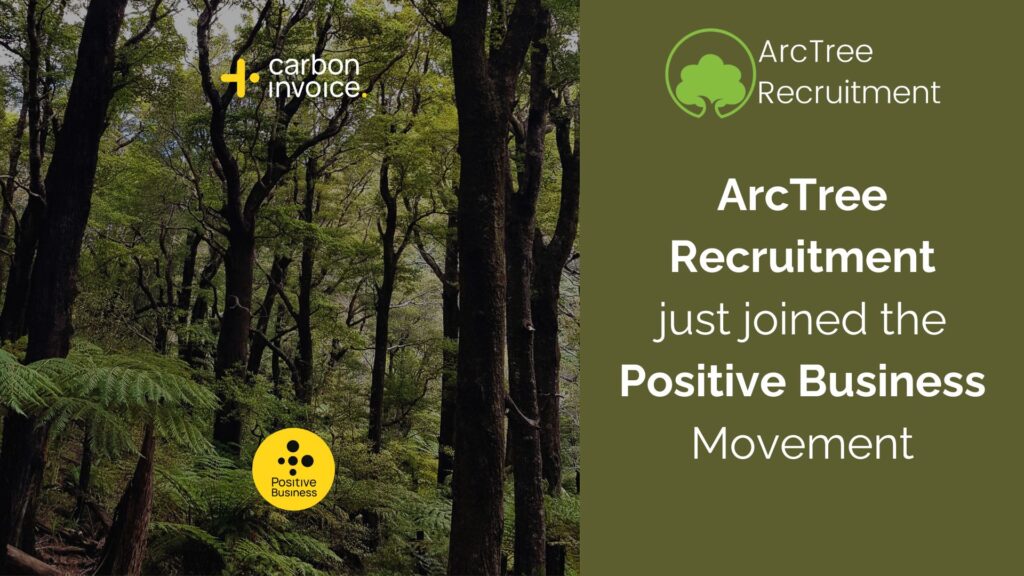Have you ever hired someone who looked brilliant on paper, interviewed well and then couldn’t perform? You’re not alone: more than 60% of managers say they’ve done exactly the same thing (and we think it’s really more than that, but people don’t want to admit it).
If only there was a reliable way to cut through the fluff – all the things a candidate wants to tell you about how good they are – and see what they’re really capable of.
The iceberg principle
Here at ArcTree, we like a good metaphor. And one of our all-time favourites is the one that likens a job candidate to an iceberg.
It’s quite obvious when you think about it: when you’re hiring someone, you can only ever get a small amount of information about them. Because we take a relatively short time to hire a new employee, when compared to the amount of time they’ll actually be working for us, we’re only ever going to scratch the surface of who they really are before we hire them.
So, we try to do the very best we can to find out as much as possible before we hire someone. Here’s what we usually do:
– Write a job description that outlines the skills, experience, qualifications we need and the tasks the person will be responsible for
– Collect resumes and application letters from candidate who want the job, so are telling you what they think you want to hear
– Read those resumes and try to work out which candidates have the right skills and experience
– Interview the shortlisted candidates by asking them questions about their past experiences and trying to work out whether they’ll be able to do a good job or not from that
– Ask a few people they’ve nominated whether they’re worth hiring
– If all the boxes above are ticked, make a hire.
In the best case scenario, the person you select will have a strong work ethic, learn quickly and work well with the rest of the team. They’ll also be motivated to do their best for your business and be happy to go the extra mile. They’ll enjoy their day-to-day tasks and won’t complain about doing what they’re paid to do. Or talk about people behind their backs. Or blame others for their failures. Or upset their peers by putting them down in public. Or refuse to accept constructive criticism. Or nod and smile when you give them instructions, and then do something else entirely.
It’s hard to get the full picture of a candidate
Hiring people is incredibly hard. And working out whether someone is actually the right person to hire is close to impossible. How can you possibly learn enough about a person to make an informed decision, when you’ve probably only spent a couple of hours with them, and everything you’ve read about them is them trying to make a good impression?
Back to the iceberg metaphor. The kinds of things you can find out about a person are usually the things you can see above the surface, such as their skills, knowledge, experience, achievements and so on (although in all frankness many of these are exaggerated in a resume).
The rest of it – what you really need to know – can’t be gleaned reliably from the information in a resume, or what a candidate tells you in an interview. And they’re the absolutely critical things we’re taking a gamble on each time we hire someone, such as:
– Will they learn quickly and use their knowledge to solve problems?
– Will they behave with integrity, so I can trust them with finances or confidential information?
– Are they going to collaborate well with the rest of the team, so I don’t have to put out fires when people can’t work together?
– Will they learn from and bounce back from setbacks?
– Will they buy into the organisation’s values and culture, and do their best to work towards our goals?
– Are they going to be able to form good relationships with the people they manage or do business with?
Interviews – if they’re extremely well structured, use the same questions for every person, and are conducted by people who are experienced and skilled at interviewing – may go a little way to shedding some light on these factors. But again, let’s be honest – how many candidates don’t tell you what they want you to hear in an interview?
Again, it’s always a risk. And unless you have the resources to interview like Laszlo Bock at Google does, with multiple rounds of interviews conducted by different people and a large hiring committee making the final decision, it’s fairly unavoidable.
It surprises me no end that while people say they’re looking for quick learners who will be engaged and work well with everyone else, they’re not actually doing much to bring that about. They’re really just relying on a few small pieces of the puzzle, or the tip of the iceberg, and trying to glean what lies below from what they can see.
Get the full picture right now
We want to help. We want to make sure that the next time you hire someone, you know everything you need to know about them and can make a sound, informed choice that will benefit your business.
Our predictive analytics tools are based on years of research into factors that are proven to predict performance at work. In an incredibly risky situation, where you can only ever see 10% of what a candidate will bring to the role, we can help you see the other 90% before it’s too late and you end up with yet another mediocre or – worse yet – bad hire.
We can assess your candidates to find out how well they’re really going to perform, regardless of what they tell you. And we can also measure how well they’ll communicate with others, what kind of work ethic they have, their work values, and everything else that really matters when you’re hiring your next employee.
We want to help you avoid costly hiring mistakes in future and to prove what we can do, we’re offering two absolutely free, comprehensive evaluations for your candidates. You’ll find out everything you need to know about the other 90% they won’t tell you about and be able to make a truly rational and informed decision.
There’s no obligation at all. Just fill in our short form and we’ll get started on your evaluations straight away.












